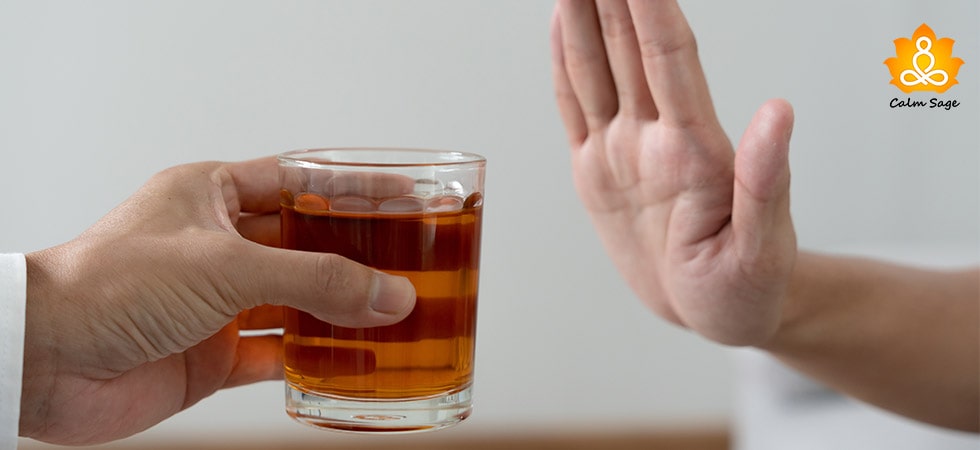Alcohol Dependence vs Alcohol Abuse : What’s the Difference?

Anything done in moderation, whether eating or working out, is acceptable because out-of-control things are usually harmful. The same is true with drinking.
Studies show that drinking in moderation has some health benefits, while when it is done without any observation, the person either gets dependent on it or is a victim of alcohol abuse.
But why does this happen? What makes the person cross the line and get alcohol dependent or abuse it? How can we distinguish between someone who is abusing alcohol and who is relying on it?
Differentiating between alcohol abuse and dependence is not as simple as pinpointing a single factor or issue. Therefore, it is essential to understand the terms individually and the circumstances that can lead to them.
What Is Alcohol Dependence?
Alcohol dependence, in simple words, means being dependent on alcohol to function. The individual dependent on alcohol consumes it in large quantities so that they can be intoxicated. Their alcohol tolerance power increases over time, due to which, to achieve the desired results, they increase the amount of alcohol they consume.
For example, if the individual used to consume 6 drinks every night, they may now require double. Another thing alcohol-dependent people experience when they don’t consume it for a short period is withdrawal symptoms, like insomnia, mood swings, and tremors. Some people are so dependent that they drink to avoid or relieve withdrawal symptoms like shaky hands, hangovers, etc.
Additionally, individuals with alcohol dependence, even if they don’t admit it to others, are also aware of their compulsion to drink alcohol. Lastly, they may drink in mass quantity or for a longer duration than intended despite unsuccessful attempts to reduce.
Signs of Alcohol Dependence
When a person has alcoholism, they will show signs associated with an alcohol use disorder. These signs include:
- Consuming excessive amounts of alcohol.
- Extreme craving for alcohol.
- Even when the individual wants to control or stop drinking, they are not to.
- Continuous drinking, even if it means compromising health.
- Developing a tolerance to alcohol, requiring larger quantities for desired effects.
- Drinks to overcome withdrawal symptoms.
- Leaves other activities and interests because of alcohol.
- Neglects personal and professional responsibilities due to alcohol.
- Spends enough time drinking and recovering from hangovers.
- Engaging in physically dangerous situations, such as drinking before driving.
- Continues drinking despite relationship issues caused by alcohol.
What Is Alcohol Abuse?
Alcohol abuse, as the name explains, is a condition where the person continuously drink despite legal, health, social, and interpersonal problems. The individual who despises alcohol might be dependent on alcohol, but they can quit drinking without showing withdrawal symptoms.
A study in a journal published “Preventing Chronic Disease” revealed that the majority of individuals who abuse liquor are not dependent on it. The study found that 90% of alcohol abusers do not show withdrawal symptoms when they stop drinking. The study also highlighted that individuals who are into binge drinking are more inclined to develop alcohol dependence.
Signs of Alcohol Abuse
Someone abusing alcohol may not meet the criteria for an alcohol use disorder. However, they are likely to show some or all of the signs of alcohol abuse. These signs include
- Regular and excessive alcohol consumption.
- Drinks to the extent that they lose consciousness.
- Justify alcohol intake.
- Claims alcohol is required for relaxation or enjoyment.
- Drink a substantial amount of alcohol to get intoxicated.
Key differences between Procedural memory and Declarative memory
| Alcohol Dependence | Alcohol Abuse |
|---|---|
|
|
|
|
|
|
|
|
|
|
|
|
Alcohol abuse and alcohol dependence are distinct conditions with significant differences. However, it is crucial to recognize that alcohol abuse can progress to alcohol dependence, underscoring the importance of distinguishing between the two.
Alcohol dependency poses greater challenges as individuals find it considerably more difficult to quit once they become dependent. This condition is recognized as a disease, and individuals undergoing treatment for alcohol dependency often need to completely abstain from drinking to avoid relapsing into previous patterns.
Nevertheless, alcohol abuse in itself is a significant issue. Even a single instance of alcohol abuse by someone who consistently engages in such behavior can result in harm to themselves or others, such as driving under the influence or engaging in reckless actions. Excessive drinking is inherently unsafe, which is why both conditions necessitate appropriate treatment.
Alcohol Withdrawal Symptoms
Alcohol withdrawal symptoms will occur when someone dependent on alcohol stops drinking. Symptoms of alcohol withdrawal can include:
- Anxiety.
- Jumpiness.
- Mood swings.
- Depression.
- Irritability.
- Confused thinking.
- Sweaty, clammy skin.
- Headaches.
- Nausea.
- Vomiting.
- Insomnia.
- Tremors.
- Agitation.
- Fever.
- Seizures.
Treatments That Can Help
If you’re considering quitting drinking, before you take any step and do it on your own, talk to a healthcare professional as doing it by yourself can be risky. The healthcare professional will help in providing treatment options during detox. Also, they can provide the needed support one needs to stop alcohol consumption.
In severe cases of alcohol withdrawal, there can be tremors, which can be life-threatening. Hence, if you experience it or any other symptoms like involuntary muscle contractions, fever, seizures, hallucinations, delusions, or rapid mood swings, don’t go back to drinking seek professional help as they can help you leave alcohol. But don’t do it on your own as your safety is of utmost importance.
Indications of alcohol withdrawal could be moderate, mild, or severe. Several symptoms could be treated at home, but it is recommended that the withdrawal symptoms of moderate to severe must be supervised by a professional healthcare individual and may need inpatient treatment.
Takeaway:
Alcohol use disorder comprises both alcohol abuse and alcohol dependency, which are now combined in DSM-V. Though they were separate conditions in the “DSM-IV” it is important to understand the distinctions between them. “Dependence” is the inability to stop drinking without experiencing withdrawal indications, while “abuse” is the continued consumption of alcohol despite negative consequences.
If you suspect that you may have an issue with alcohol, discuss it with a healthcare provider. They can guide you on how to approach your treatment and support you through the process of detoxification, withdrawal, and recovery from alcohol use disorder. Each person’s experience with alcohol is unique, but effective treatments are available regardless of the severity of your condition.




















